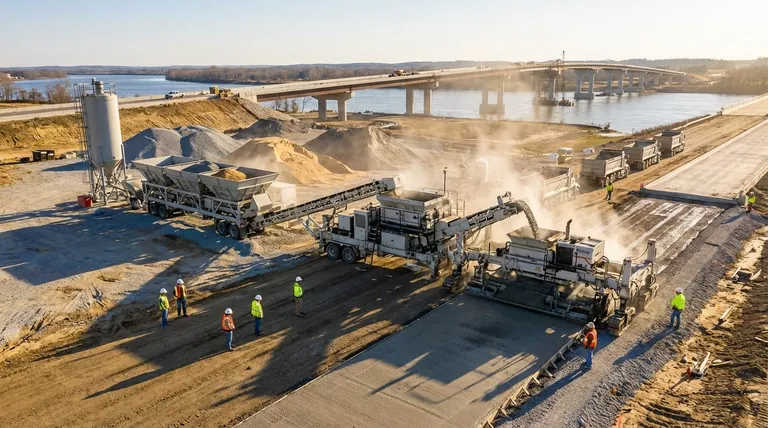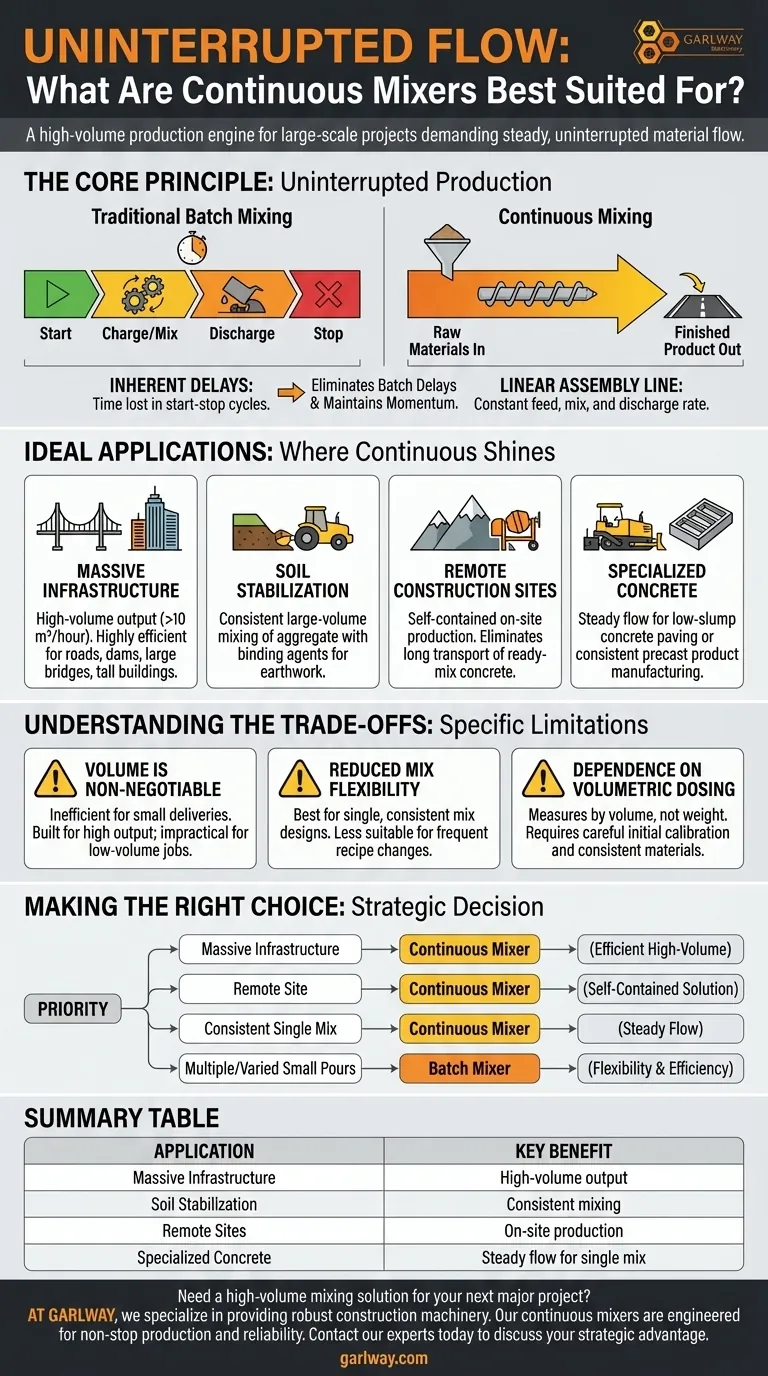At its core, a continuous mixer is a high-volume production engine. It is best suited for large-scale projects that demand a steady, uninterrupted flow of material, such as concrete or stabilized soil. This makes it the ideal solution for major infrastructure like roads and bridges, remote construction sites, and industrial applications where stopping production is not an option.
The decision to use a continuous mixer is not just about the total volume needed, but about the strategic advantage of maintaining constant momentum on a job site, which fundamentally changes project logistics and efficiency.

The Core Principle: Uninterrupted Production
The primary advantage of a continuous mixer is its ability to operate without the start-stop cycles inherent in traditional batch mixing. This creates a highly efficient, streamlined workflow for specific types of projects.
How Continuous Mixing Works
A continuous mixer functions like a linear assembly line. Raw materials are fed constantly into a hopper at one end, moved and mixed by a long auger or screw, and discharged as finished product at the same, continuous rate from the other end.
Eliminating Batch Delays
This design entirely removes the time lost charging, mixing, and discharging separate batches. The result is a steady, predictable stream of material that can keep pace with demanding applications like large-scale paving or soil stabilization efforts.
Ideal Applications for Continuous Mixers
The unique operational model of continuous mixers makes them the superior choice for a distinct set of construction and industrial scenarios.
Massive Infrastructure Projects
For projects like highways, dams, large bridges, and tall buildings, the sheer volume of concrete required makes continuous mixing highly efficient. The machine's ability to produce more than 10 cubic meters per hour ensures that work can proceed without delay.
Soil Stabilization
Continuous mixers are commonly used in soil stabilization, where large volumes of aggregate need to be consistently mixed with cement or another binding agent. Their high throughput is perfectly matched to the needs of large-scale earthwork and foundation projects.
Remote Construction Sites
On remote sites, the logistics of transporting ready-mix concrete from a distant batching plant can be a significant challenge. A continuous mixer provides a self-contained, on-site production facility, ensuring a fresh supply is always available.
Specialized Concrete Production
Certain applications benefit from the steady flow of a continuous mixer. This includes producing low-slump concrete for road paving or supplying a consistent mix for manufacturing precast concrete products.
Understanding the Trade-offs
While powerful, continuous mixers are specialized tools. Their advantages in volume and consistency come with specific limitations that make them unsuitable for other types of jobs.
Volume is Non-Negotiable
These machines are built for high output. They are inefficient and impractical for small deliveries or projects requiring only a few cubic meters of concrete at a time. Their value is realized only during prolonged, high-volume production runs.
Reduced Mix Flexibility
Continuous mixers are best for projects that require a single, consistent mix design for an extended period. Adjusting the mix is more involved than with a batch system, making them less suitable for jobs that require frequent changes to the concrete recipe.
Dependence on Volumetric Dosing
Most continuous mixers rely on volumetric dosing—measuring materials by volume rather than weight. While highly effective, this requires careful initial calibration and consistent material properties to ensure the final product meets specifications.
Making the Right Choice for Your Project
Selecting the right mixing technology depends entirely on the unique demands of your job site and project goals.
- If your primary focus is a massive infrastructure project: A continuous mixer is the most efficient choice for its unparalleled high-volume, non-stop output.
- If your primary focus is a remote site with logistical challenges: A continuous mixer offers a practical, self-contained solution, removing the dependency on off-site batch plants.
- If your primary focus is consistent, high-volume production of one mix design: The steady, uninterrupted flow from a continuous mixer is perfectly suited for applications like paving or precast manufacturing.
- If your primary focus is a project with multiple, small, or highly varied pours: A traditional batch mixer will provide the necessary flexibility and efficiency for smaller, distinct tasks.
Ultimately, choosing a continuous mixer is a strategic decision to prioritize relentless production volume and logistical simplicity over mix-by-mix flexibility.
Summary Table:
| Application | Key Benefit |
|---|---|
| Massive Infrastructure (Roads, Bridges) | High-volume output (>10 m³/hour) |
| Soil Stabilization | Consistent mixing for large-scale earthwork |
| Remote Construction Sites | On-site production, eliminates transport delays |
| Specialized Concrete (Paving, Precast) | Steady flow for a single, consistent mix design |
Need a high-volume mixing solution for your next major project?
At GARLWAY, we specialize in providing robust construction machinery for demanding applications. Our continuous mixers are engineered to deliver the non-stop production and reliability required for large-scale infrastructure, remote sites, and specialized concrete work.
Let us help you maintain project momentum and achieve superior efficiency.
Contact our experts today to discuss how a GARLWAY continuous mixer can be the strategic advantage for your construction company or contracting business.
Visual Guide

Related Products
- Ready Mixer Machine for Construction Ready Mix Machinery
- Portable Concrete Mixer Machine Equipment for Mixing Concrete
- Hydraulic Concrete Mixer Machine Cement Mixing Equipment for Mixture Concrete
- Commercial Construction Mixer Machine for Soil Cement Mixing Concrete
- Portable Ready Mix Concrete Mixer Equipment
People Also Ask
- What is the function of a concrete mixer machine? Achieve Consistent, High-Quality Concrete for Your Projects
- What is the average lifespan of a concrete mixer? Maximize Your Equipment's Lifespan & ROI
- What safety considerations are important for concrete mixer operation? A Guide to Proactive Risk Management
- Can a concrete mixer be used for mortar? Understanding the trade-offs for your project
- What should be considered regarding the output of a concrete mixer? Match Capacity to Your Project Scale



















